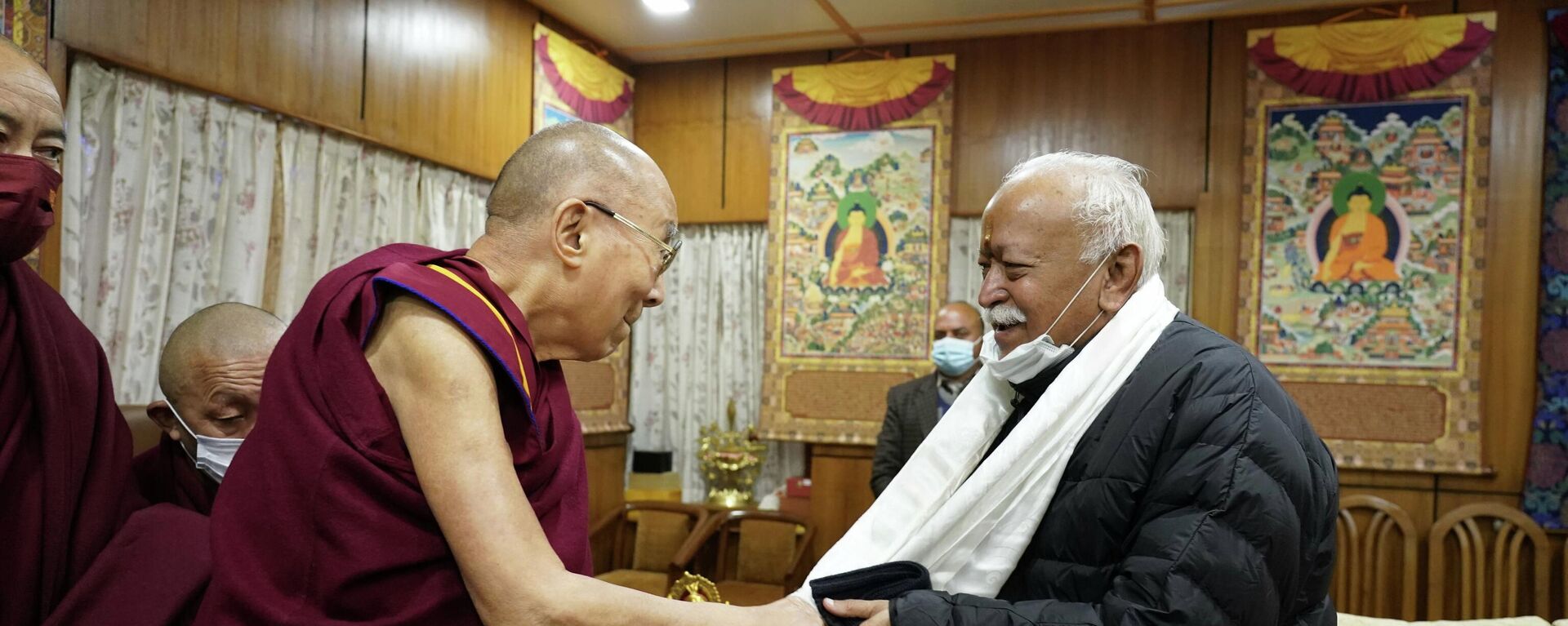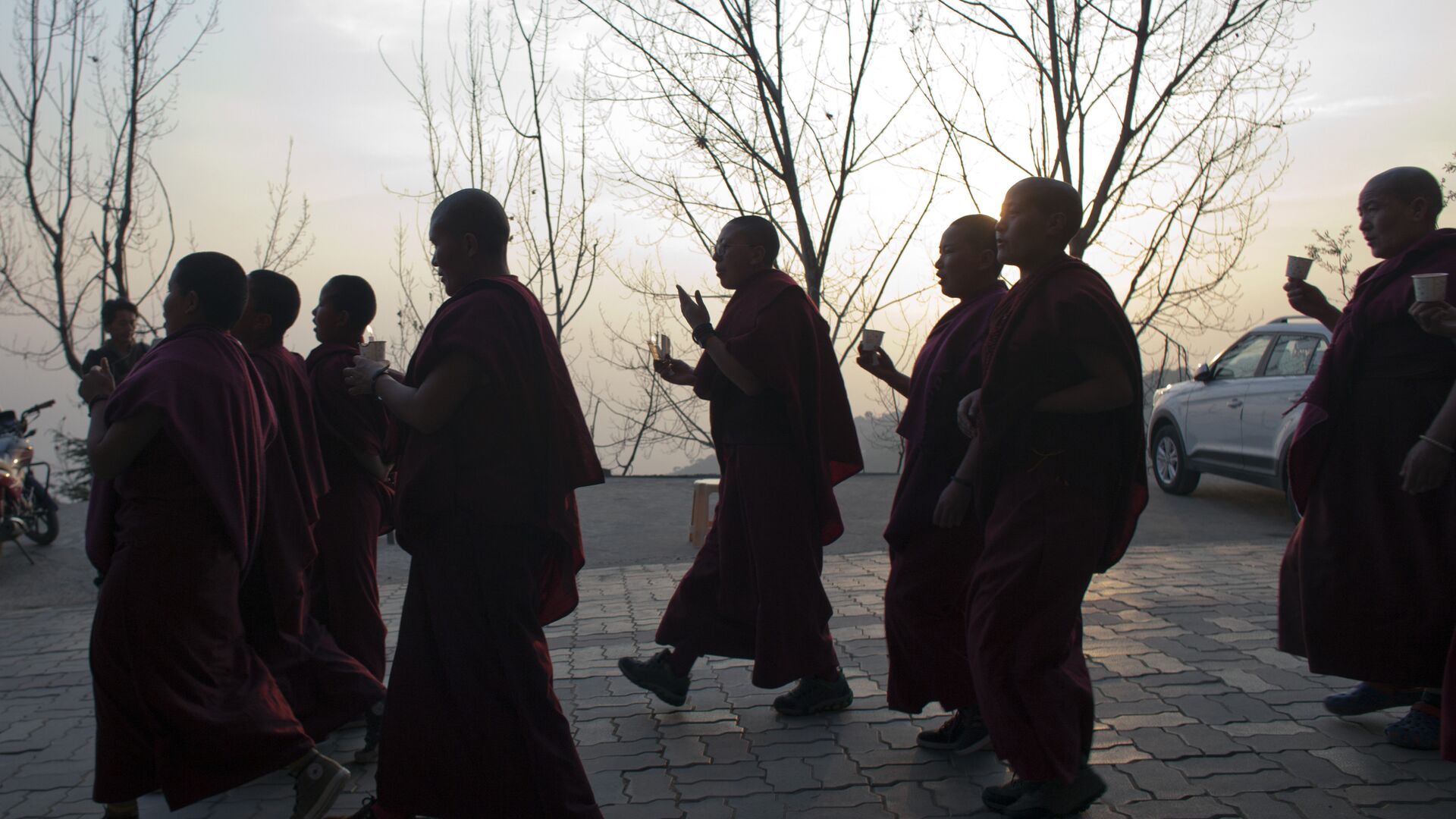https://sputnikglobe.com/20211231/china-warns-indian-mps-against-backing-tibetan-independence-forces-after-they-attend-dinner-1091933358.html
China Warns Indian MPs Against Backing 'Tibetan Independence Forces' After They Attend Dinner
China Warns Indian MPs Against Backing 'Tibetan Independence Forces' After They Attend Dinner
Sputnik International
The Chinese Embassy in New Delhi has warned six Indian parliamentarians, including a federal minister, against supporting "Tibetan independence forces" after they attended a dinner hosted by the Tibetan Parliament-in-exile, The Indian Express reported on Friday.
2021-12-31T08:30+0000
2021-12-31T08:30+0000
2022-10-19T20:36+0000
dalai lama
tibet
ladakh standoff
bharatiya janata party (bjp)
china
congress
https://cdn1.img.sputnikglobe.com/img/105660/37/1056603758_0:0:4442:2500_1920x0_80_0_0_e6b1052a91326e2f6587eeef88145423.jpg
The Chinese Embassy in New Delhi has warned six Indian parliamentarians, including a federal minister, against supporting "Tibetan independence forces" after they attended a dinner hosted by the Tibetan Parliament-in-exile, The Indian Express reported on Friday.The intended recipients of the letter include Rajeev Chandrasekhar, Indian Minister of State (MoS) for Entrepreneurship, Skill Development, Electronics & Technology, and ruling Bharatiya Janata Party parliamentarians Maneka Gandhi, and K.C. Ramamurthy. Jairam Ramesh, and Manish Tewari, parliamentarians from the country's main opposition party Congress as well as Sujeet Kumar, another lawmaker from a regional party, Biju Janata Dal (BJD), also attended the dinner reception.All of the MPs are members of the "All-Party Indian Parliamentary Forum for Tibet (APIPFT)", with the BJD's Kumar this month appointed as the group's convenor.The Chinese official further described the Tibetan Parliament-in-exile as an "out-and-out separatist political group".Zhou additionally called on Indian lawmakers to respect New Delhi's official position about the Tibet Autonomous Region (TAR) being an "inseparable" part of China and understand the "sensitivity" of the whole issue.The president of the All-Party Indian Parliamentary Forum for Tibet, Sujeet Kumar, has reportedly slammed the Chinese mission for sending out the letter to the MPs, as he questioned why the Chinese official had not lodged its protest with the Ministry of External Affairs (MEA).The Tibetan Parliament-in-exile, headquartered in the northern Indian city of Dharamshala, was set up in the country after the Dalai Lama and his followers fled a Chinese crackdown in the wake of a failed uprising in 1959. At present, around 100,000 Tibetan exiles live in different parts of the country.In spite of hosting a large Tibetan diaspora and its exiled government, New Delhi has officially been mindful of Beijing's sensitivities on the Tibetan question.However, there has been a perceptible shift in attitudes towards the Tibet issue among several Indian politicians in the wake of the eruption of the Ladakh border dispute between Delhi and Beijing last year.Over the past few months, leading BJP members, which include Defence Minister Rajnath Singh and Arunachal Pradesh State Chief Pema Khandu, have claimed that India "shares a border" with Tibet and not China, indicating a hardening of attitudes towards Beijing within New Delhi's ruling establishment.
https://sputnikglobe.com/20211221/meeting-between-dalai-lama-rss-chief-reflects-indias-evolving-approach-on-tibet-reckons-expert-1091690864.html
tibet
ladakh standoff
china
Sputnik International
feedback@sputniknews.com
+74956456601
MIA „Rosiya Segodnya“
2021
News
en_EN
Sputnik International
feedback@sputniknews.com
+74956456601
MIA „Rosiya Segodnya“
Sputnik International
feedback@sputniknews.com
+74956456601
MIA „Rosiya Segodnya“
india, china, tibet, china warns indian mps against backing 'tibetan independence forces' after they attend dinner
india, china, tibet, china warns indian mps against backing 'tibetan independence forces' after they attend dinner
China Warns Indian MPs Against Backing 'Tibetan Independence Forces' After They Attend Dinner
08:30 GMT 31.12.2021 (Updated: 20:36 GMT 19.10.2022) In 2018, Prime Minister Narendra Modi's government asked senior ministers and officials to refrain from attending events organised by the Tibetan government-in-exile, citing "very sensitive" times in India-China bilateral ties.
The Chinese Embassy in New Delhi has warned six Indian parliamentarians, including a federal minister, against supporting "Tibetan independence forces" after they attended a dinner hosted by the
Tibetan Parliament-in-exile,
The Indian Express reported on Friday.

21 December 2021, 13:47 GMT
The intended recipients of the letter include Rajeev Chandrasekhar, Indian Minister of State (MoS) for Entrepreneurship, Skill Development, Electronics & Technology, and ruling Bharatiya Janata Party parliamentarians Maneka Gandhi, and K.C. Ramamurthy.
Jairam Ramesh, and Manish Tewari, parliamentarians from the country's main opposition party
Congress as well as Sujeet Kumar, another lawmaker from a regional party, Biju Janata Dal (BJD), also attended the dinner reception.
All of the MPs are members of the "All-Party Indian Parliamentary Forum for Tibet (APIPFT)", with the BJD's Kumar this month appointed as the group's convenor.
The letter by Zhou Yongsheng, the political counsellor at the Chinese Embassy, pointed out that "China firmly opposes any anti-China separatist activities conducted by 'Tibetan independence' forces in any capacity or name in any country and opposes any forms of contact by officials of any country with them", according to the media report.
The Chinese official further described the Tibetan Parliament-in-exile as an "out-and-out separatist political group".
"As is known to all, the so-called 'Tibetan government-in-exile' is an out-and-out separatist political group and an illegal organisation completely in violation of China's Constitution and laws. It is not recognised by any country in the world", Zhou also said in his letter.
Zhou additionally called on Indian lawmakers to respect New Delhi's official position about the Tibet Autonomous Region (TAR) being an "inseparable" part of China and understand the "sensitivity" of the whole issue.
The president of the All-Party Indian Parliamentary Forum for Tibet, Sujeet Kumar, has reportedly slammed the Chinese mission for sending out the letter to the MPs, as he questioned why the Chinese official had not lodged its protest with the Ministry of External Affairs (MEA).
"Personally speaking, I don't consider Tibet to be a part of China. That is separate because the government of India's official policy is different", Kumar was also quoted in the report as saying.
The Tibetan Parliament-in-exile, headquartered in the northern Indian city of Dharamshala, was set up in the country after the
Dalai Lama and his followers fled a Chinese crackdown in the wake of a failed uprising in 1959.
At present, around 100,000 Tibetan exiles live in different parts of the country.
In spite of hosting a large Tibetan diaspora and its exiled government, New Delhi has officially been mindful of Beijing's sensitivities on the Tibetan question.
However, there has been a perceptible shift in attitudes towards the Tibet issue among several Indian politicians in the wake of the eruption of the Ladakh border dispute between Delhi and Beijing last year.
Over the past few months, leading BJP members, which include Defence Minister Rajnath Singh and Arunachal Pradesh State Chief
Pema Khandu, have claimed that India "shares a border" with Tibet and not China, indicating a hardening of attitudes towards Beijing within New Delhi's ruling establishment.




